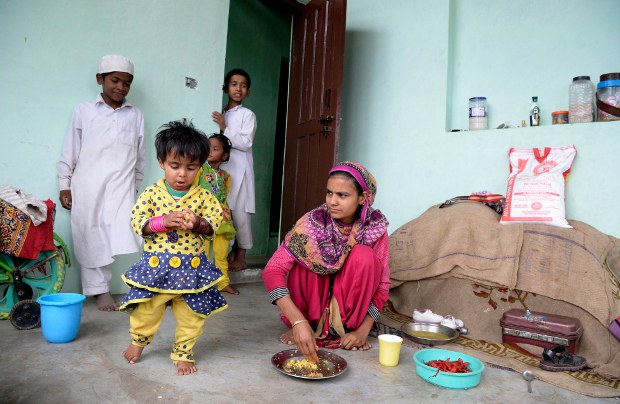Indian Government Links Rohingya Refugees to Terror Groups
2017.09.19
New Delhi
 A Rohingya refugee feeds her daughter in a building on the outskirts of Srinagar, in Indian Kashmir, Sept. 14, 2017.
A Rohingya refugee feeds her daughter in a building on the outskirts of Srinagar, in Indian Kashmir, Sept. 14, 2017.
The Indian government has told the country’s top court that it has evidence to link Rohingya refugees with terror outfits, while justifying its plan to deport some 40,000 members of the Muslim minority from Myanmar who have settled in India.
In an affidavit to the Supreme Court, the Ministry of Home Affairs said Monday it would confidentially share evidence collected by security agencies that indicated “linkages of some of the unauthorized Rohingya immigrants with Pakistan-based terror organizations and similar organizations in other countries.”
“[The] Rohingya presence in the country has serious national security ramifications. There is a serious possibility of eruption of violence against Buddhists who are Indian citizens and who stay on Indian soil by radicalized Rohingyas,” the ministry said in the affidavit, which was made public on Tuesday.
The government also has evidence of involvement of some Rohingya in plots by the Islamic State (IS) and other extremist groups to ignite communal violence in India, it said.
The Supreme Court is hearing an appeal lodged by two Rohingya refugees – Mohammad Salimullah and Mohammad Shaqir – against the deportation plan proposed by the country’s Hindu nationalist government, at a time when more than 400,000 Rohingya have fled to southeastern Bangladesh from a fresh cycle of violence in Myanmar’s Rakhine state since late August.
Coordinated attacks by the Arakan Rohingya Salvation Army (ARSA) insurgents on Myanmar border police posts in Rakhine on Aug. 25 triggered the violence, according to the Myanmar government. Its military has been accused of carrying out mass atrocities against the stateless Rohingya, allegations that the government has rejected.
In India, Additional Solicitor General Tushar Mehta told the Supreme Court that the government would share evidence that links Rohingya refugees with extremist groups at the next hearing on Oct. 3.
ARSA, however, has denied ties to any terror organizations.
“ARSA feels that it is necessary to make clear that it has no links with Al Qaeda, the Islamic State in Iraq and Syria … Lashkar-e-Taiba or any other transnational terrorist group and we do not welcome the involvement of these groups in the Arakan [Rakhine] conflict,” ARSA said in a statement last week, two days after global terrorist organization al-Qaeda announced that its fighters would come to the defense of Rohingya.
‘A case of religious discrimination’
Meanwhile, Indian analysts urged Prime Minister Narendra Modi’s government to deal with the persecuted minority compassionately.
“This [deportation plan] is a case of religious discrimination and an attempt to arouse an anti-Muslim feeling,” according to Prashant Bhushan, a lawyer representing the Rohingya refugees.
Vinay Kaura of the Center for Peace and Conflict Studies expressed skepticism over the government’s claim that Rohingya refugees were involved with terror groups.
“It is possible that some extremist outfits might be attempting to radicalize Rohingya refugees. But aside from a couple of isolated incidents, we haven’t seen Rohingya breaking any laws in India,” Kaura told BenarNews.
“The government needs to follow a comprehensive and holistic approach while dealing with Rohingya refugees,” he said.
Shakir Ali, general secretary of the All India Minorities Commission, said the Indian government should withdraw its plan to deport Rohingya refugees.
“The Rohingya are treated worse than animals in Myanmar. How can India send them back, knowing very well that they will probably be killed there?” he told BenarNews.
In its affidavit, the government said that by allowing Rohingya refugees to stay on in India, it would encroach upon the basic human rights of Indians.
“The scheme of the Constitution makes it very clear that India, as a sovereign nation, has the first and the foremost constitutional duty and obligation toward its citizens to ensure that demographic and social structure of the country is not changed to their detriment,” the affidavit said.
“Already due to [an] existing large influx of illegal immigrants from neighboring countries, the demographic profile of some bordering states has undergone a serious change which is already causing the far-reaching complications in various contexts and is taking its toll and has a direct detrimental effect on the fundamental and basic human rights of the country’s own citizens,” it said.
India’s National Human Rights Commission said it would oppose the government’s plan.
“We will intervene in the matter on [humanitarian] grounds. We are a human rights body and if these persons are deported back to their country, we see it as a violation of human rights,” the Times of India quoted NHRC chairman H.L. Dattu as saying.
Describing the issue as a “sensitive matter,” Minister of State for Home Affairs Kiren Rijiju said: “Whatever [the] Indian government will do will be in the nation’s interest. I request human rights bodies to not spread misinformation about India and the Indian government. Protecting the nation is our duty.”







